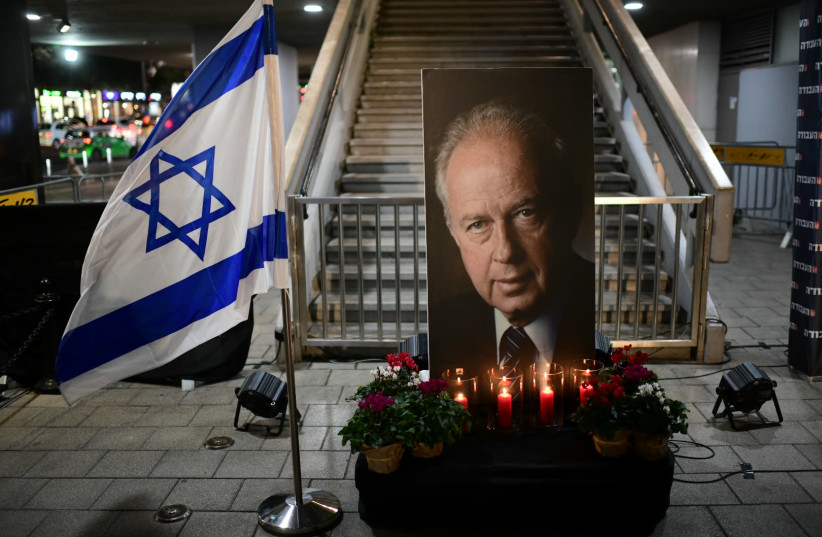After this devastating war is over – which we pray will be effective and its conclusion soon – we will no doubt start arguing again. It’s a time-honored Jewish and Israeli tradition: Religious/secular; Right/Left, pro-government/anti-government. And, who’s to blame? Some of the arguments have already started.
But, before we resume arguing, I’d like to recommend that we practice restraint: a self-imposed silence, a ta’anit dibbur, a “fast” on speaking. I do this every year, on the 12th of Heshvan, the date on which Yitzhak Rabin was assassinated, though it’s being marked today, one day earlier, because the actual date falls this year on the eve of Shabbat.
Twenty-eight years ago was a Saturday night and my wife and I had traveled to Jerusalem after Shabbat to do some shopping. We had no intention of joining the Tel Aviv rally in support of the Oslo Accords, because we did not agree at all with prime minister Rabin’s policies.
Suddenly, from the store’s radio, we heard the shocking news: the prime minister had been shot! My wife and I, both American-born and old enough to remember other assassinations – of US president John F. Kennedy, Rev. Martin Luther King, Jr., and Egyptian president Anwar Sadat – had the same horrified, incredulous reaction: This can’t be happening, not in Israel!
And then, we heard people in the store, and later people in the street, expressing satisfaction over the news. Never had we felt more ashamed. What had happened to Israel?

As we mark the 28th anniversary of the Rabin assassination, I am reminded of the way this horrible event has been commemorated in the past. Throughout the week or so leading up to the 12th of Heshvan, all of Israel was immersed in “dialogue.” People from opposite ideological camps were brought together, in the media and in open debates, to try to bridge the gaps between us. It was said we needed this process for national heshbon nefesh, introspection, stock-taking, and healing.
But the whole process left me frustrated and sad.
Almost every “dialogue,” although airing important issues, degenerated into shouting of accusations. Everyone wanted to make it clear that it was not their camp, but only that of the others, who were to blame for Rabin’s death.
Grief deteriorated into finger-pointing. What should have become a tikkun intensified the causes of the tragedy. Wounds remained unhealed, producing greater disrespect, more hillul Hashem (profaning of God’s name).
The assassination was both caused by the divisions in our society and exacerbated them. A Jew who considered himself God-fearing and a patriot shot his democratically elected, war hero, fellow-Jewish and fellow-Israeli prime minister, in the back. And without for a moment relieving the one who pulled the trigger of guilt, we should acknowledge that the backdrop to the assassination was hostile speech: inflammatory, hateful, divisive words, from every camp. As Abraham Joshua Heschel wrote, “In regard to cruelties committed in the name of a free society, some are guilty, while all are responsible.”
The divisions in our society have not gone away during the past 28 years. Instead, we have been speaking more and more dangerously. Any real dialogue, that is, an exchange of ideas founded upon an unspoken commonality, approaches the impossible.
Israel hate speech, divisions will return when the war with Hamas ends
While it is true that we have mostly put aside our differences during this war, I am afraid that the same hateful and divisive speech will reappear when the war is over.
It seems we have two choices: either succumb to the dissolution of our society embodied in Rabin’s assassination, or learn the painful lessons it teaches.
Everyone was affected by, and should atone for, Rabin’s assassination. That is why I observe part of the 12th of Heshvan in silence. And when my personal ta’anit dibbur is over, I am always much more conscientious about what I say to my family, friends, and students.
But imagine a national ta’anit dibbur: a day, or half a day, or even an hour, but significantly more than a minute of silence, when no non-essential speech would be uttered, a day of nationwide verbal self-control.
Self-imposed silence has a respected history in Judaism. In Days of Awe, S. Y. Agnon records the widespread custom of ta’anit dibbur during the month of Elul and the Ten Days of Repentance. Many sages of the Mussar movement encouraged their students to undertake a ta’anit dibbur, rather than a fast, as a form of personal penance.
Rabbi Yitzhak Hutner (1906-1980) preferred that brides and grooms not fast on their wedding day, as is the Ashkenazi custom, but rather accept a ta’anit dibbur, to learn the value of self-restraint in married life.
I am not recommending abolishing dialogues before, and especially after, the anniversary of the killing. On the contrary; a ta’anit dibbur would put these dialogues into the correct perspective, keeping them from degenerating into maliciousness.
Religious or secular, everyone should acknowledge the moral benefits of verbal self-discipline. In the words of the Ethics of the Fathers, “Silence is a safeguard to wisdom.”
I plan on devoting at least an hour this Friday to be quiet, alone with my thoughts. I will try to transcend my political differences with the late Yitzhak Rabin in order to grasp fully what has happened. I will meditate on the question: How did my action, or inaction, foster an atmosphere that sanctioned, if only in one person’s mind, this catastrophic murder? How can I contribute to an environment of constructive criticism in our present political reality?
Anyone can join me in spending part of this 12th of Heshvan in a silence that will teach the power of words. What we will say afterward will then have greater sensitivity and value.
The writer, a rabbi, is a teacher in several adult Jewish education programs in Israel. He lives in Beit Shemesh.
